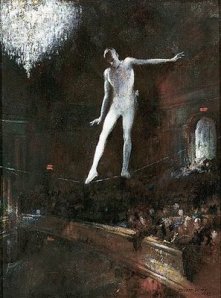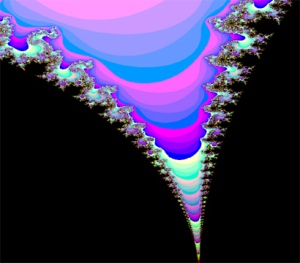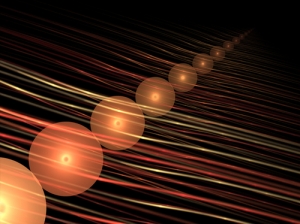Heidekolb's Blog
In the Beginning there was the Word ~ C.G.Jung-The Red Book Reflections | November 29, 2010
I am not a great believer in words..but I guess the more people believe in words the more powerful they can be.. (thank you Mona K). I came across these words in my twitter stream just as I pondered Jung’s imaginal encounter with “the Anchorite” in the Red Book (RB), in which the two of them discuss the meaning of words.
We are shaped by the spoken and, to even a greater degree, by the written word.

The Anchorite (an inner, imaginal figure) speaks to Jung: “Surely you know that one can read a book many times – perhaps you almost know it by heart, and nevertheless it can be that, when you look again at the lines before you, certain things appear new or even new thoughts occur to you that you did not have before”.
What is suggested here is to appreciate the “word” as a symbol and not as a sign with a definitive, unmovable meaning. A symbol is a door into the unknown and language, the word, can be such a portal. We all the know the power of poetry or of a book that transported us into another world. A good piece of writing can take us to very unexpected places, if we allow it to happen. “A succession of words does not have only one meaning. But men strive to assign only a single meaning to the sequence of words, in order to have unambiguous language”, the Anchorite proclaims.
Like a tightrope walker we are asked to perform a delicate balancing act. Words and language allow us to grasp and assimilate the nature of reality. It is hard to detach the word from human consciousness. “What was word, shall become man. The word created the world and came before the world. It lit up like a light in the darkness“, Jung writes. He also says that “this striving is worldly and constricted” and the mysterious addition that this striving “belongs to the deepest layers of the divine creative plan”.
Words and language allow us to grasp and assimilate the nature of reality. It is hard to detach the word from human consciousness. “What was word, shall become man. The word created the world and came before the world. It lit up like a light in the darkness“, Jung writes. He also says that “this striving is worldly and constricted” and the mysterious addition that this striving “belongs to the deepest layers of the divine creative plan”.
Initially the limited, narrow range of meaning provides security. We need to believe the illusion that we know what is what. Jung writes, “the unbounded makes you anxious since the unbounded is fearful and humanity rebels against it”.
The paradox: We must build walls of meaning in order to emerge as conscious beings out of the chaos, but then these very walls must be broken down, because “words should not become Gods”.
One way of measuring ego-strength and maturity of personality is to assess a person’s capacity to tolerate ambivalence. This capacity is closely related to the ability to feel empathy. It is all about tolerating otherness. Empathy is the genuine ability to see the world through the eyes of another. Another who is truly different, someone who cannot be easily understood. It takes effort (and ego-strength) to make room for another standpoint, another meaning. There are many ways to be right. We have reached maturity when we can give up tour need to be right without losing ourselves and our values.
Imagine ~ making room ~ imagine that the entire universe is within you and every person, every other living creature is a parallel universe ~ no either/or, no right or wrong
“He who breaks the walls of words overthrows Gods and defiles temples”, Jung writes. We need to break down the prison of stale and empty words. We need to dismantle inherited belief systems, which have lost the spark of life. We need to give up the delusion that a word in itself represents truth. It does not matter whether the word is in the Bible or in another writing considered sacred, in your favorite novel, on the internet or in one of our ingrained thought patterns. The word may give us temporary security. That may be necessary for some time. But the evolution of consciousness cannot be stopped, it can only be resisted, which makes it harder. The evolutionary trajectory of life pushes us towards new meaning. Meaning full of juicy freshness and uniquely individual. This is what Jung’s entire life’s work was about. But this encouragement comes with a warning. Jung writes: “But no one should shatter the old words, unless he finds the new word that is a firm rampart against the limitless and grasps more life in it than in the old word”. We find this over and over again in Jung’s work. Jung who parted ways with Freud, because he believed that the unconscious did not only need to be tamed, but was also the source of rejuvenation and great treasures, was also acutely aware that its forces were so powerful that it could sweep us into the chaos of psychosis at any time.
The word is a container and a prison. We need to find the balance on the tightrope. Words, stories, narratives create our lives. As we grow, our stories, memories and narratives can change. Are our narratives, the way we think about ourselves still true? Are they still meaningful in the sense that light and life are pulsating through them? Or do they need to be shed like a serpent leaves its old skin behind? Nothing is forever. We are always becoming.
Nothing is forever. We are always becoming.
11 Comments »
Coincidentally, I was involved in a long, drawn-out discussion about this precise subject with friends who major in Anthropology and Literature over the weekend.
As I see it (from an AntiPoetic perspective), the power of language seems to be largely overlooked and is therefore understated. That alone should be cause for concern since our unconscientious use of language results in it becoming a mental cage instead of simply acting as a tool for communication or an avenue of creative expression.
Great article, enjoyed the insights gleaned from Jung’s esoteric psychology!
Comment by itzquauhtli — November 29, 2010 @ 5:31 am
[…] substantial number of responses to the satirical piece about Sarah Palin that appeared both in this Jungcurrents blog and the Anchorage Daily News have involved denigrating […]
Pingback by The Red Book, Heidi Kolb’s Blog, and the Palin Complex — November 29, 2010 @ 1:03 pm
really appreciated this perspective. thank you for taking the time to share with us.
cheer,
~a.
Comment by annie q. syed — November 29, 2010 @ 1:29 pm
Timely comment, always nice to see commentary about the Red Book.
Headlined your blog, particularly relevant to ambiguity and the Palin Complex.
http://jungcurrents.com/the-red-book-heidi-kolbs-blog-and-the-palin-complex/
Thanks —
steve parker
Comment by Steve Parker — November 29, 2010 @ 1:33 pm
It’s our thoughts that actualize ourselves isn’t it?
Comment by Charles Frith — November 29, 2010 @ 3:15 pm
I suggest to think of it the following way. According to Jung there are two kinds of thinking. Willful directed thinking and non-directed dream-like thinking in images that emerges out of the unconscious. Either way, we are not our thoughts. Problems arise when we when we identify with them. But both kinds of thinking can be used to learn, grow and to give one’s life direction.
Comment by heidekolb — November 29, 2010 @ 11:24 pm
Thank-you Heide. I love your posts. I find words changing for me. What they were before…not the same now–some of them. This makes sense. They temporarily represent what we think they mean. 🙂
Comment by Goddess Aphrodite — November 29, 2010 @ 8:59 pm
Hello Heidi,
I very much appreciated this commentary on the encounter with the Anchorite in the Red Book. I think that it’s very important for us to reflect in a thoroughgoing way on words, and on the use of language. As you point out, Jung, without diminishing the value of words or of language, nonetheless consistently relativized these things in favour of the symbol, and, behind it, archetypal reality. This is very notable, for instance, in Jung’s remarks at various points on philosophers like Heidegger, and their use of what Jung ironically calls “power words”.
Of course, Jung’s critique of our society’s over-reliance on language goes much further and deeper than mere criticism of overly verbose, hopelessly abstract (in this case, Nazi) philosophers. But I can’t help but feel that Jung’s criticism is particularly well-placed. A philosopher like Heidegger embodies a very important mistaken belief that runs deep in our society: that the nature of life and reality can ultimately be captured in language. That would be the ultimate triumph of Logos. Jung says that’s not on. Jung is absolutely right.
I believe that, in this respect, Jung has a very important message for our society. I think we need to listen before we lose ourselves as a culture completely.
THanks again for this great post!
Comment by Brian Collinson — November 30, 2010 @ 5:04 pm
This blog has definitely widened my horizon where words and language are concerned.A newfound meaning of the same has come to existence which I was earlier unaware of.How true is the fact that everytime i read the same words i discover a new meaning to it.This blog confirms what i always feel.
Comment by devyani — January 19, 2011 @ 1:59 am
Thank you for your blog post. The more I reflect on Jung, the more I realize I need Jung in my life.
Comment by Hege — March 18, 2011 @ 5:05 pm
I absolutely adore your blog. Your writing style is like lush poetry on an otherwise barren plane. God bless you!
Comment by Cameron — March 19, 2013 @ 8:11 am